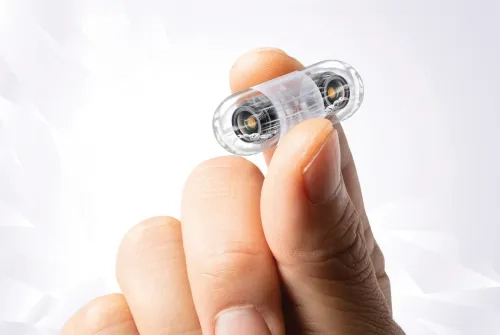Alo Yeditepe
Alo Yeditepe
What are Capsule Treatment Methods in Stomach, Small, and Large Intestine Screening?
There are 3 types of capsules for stomach, small, and large intestine screening.
- Capsule Colonoscopy
- Bravo Capsule
- Capsule Enteroscopy
Capsule Colonoscopy
PC 2-column capsules started to be used in Europe's leading universities at the beginning of 2010. It is used in Yeditepe University Hospitals in Turkey.
- Having cameras at both ends,
- Being able to intervene in the capsule location by observing the location of the capsules simultaneously from the waist recording device,
- Being able to perform the measurement,
- The fact that each capsule camera angle reaches the maximum level (recording like a sphere) at 172 degrees is the factors that bring 90 percent success.
How is Capsule Colonoscopy Procedure Performed?
- The patient is given medications for intestinal cleansing the night before.
- The patient should be present at the clinic at 09:00 on the morning of the procedure.
- After making definitions related to the patient on the recording device, the recording device is attached to the patient's belt.
- A capsule is given to the patient,
- At 11:00, the medication that the physician deems appropriate should be taken to regulate bowel movements.
- At 17:00, the belt-mounted recording device is delivered to the clinic.
- After the procedure, the records are examined by the physician and a report is written.
There is no sedation or advancement of the endoscope through the rectum during the procedure, and the capsule is excreted with feces after the swallowed capsule. You do not even need a follow-up. During the procedure, the patient can continue his/her daily activation as usual.
Bravo Capsule 24-Hour pH Monitoring
24-hour acid monitoring is the placement of acid-sensing sensors in the patient's esophagus. These sensors record for 24 hours and mathematically record how much acid is lost during the day in a computer environment.
To Whom Is It Applied?
- If there is doubt in the diagnosis of reflux,
- In patients who are scheduled for an operation or treatment,
- If reflux complaints persist despite appropriate medical treatment,
- If the complaints continue after the operation, a bravo capsule can be applied.
Capsule Enteroscopy
It is the evaluation of the small intestines with capsules. They have similar preparation and working principles to colon capsules. Today, it is the first method used in the diagnosis of small intestine diseases.
In capsule enteroscopy, a pill-sized camera is given to the patient by drinking the capsule, and the image perceived by this capsule is recorded on a device attached to the patient's belt. This recording is then viewed on the computer. The capsule remains in the body for about 12 hours and is eventually excreted in the feces. During this period, the patient does not need to stay in the hospital; he/she can be at home or work. This method is ideal for patients who cannot be put to sleep with sedation, who have respiratory distress, and who are afraid of standard colonoscopy.
While endoscopic procedures such as gastroscopy and colonoscopy are performed for diagnosis, there is also the possibility of treatment. For example, when a polyp is seen, it can be cut out or if a bleeding is seen, it can be burned with cautery and the bleeding can be stopped. In patients who have the opportunity to receive this type of treatment, it is beneficial to perform classical colonoscopy rather than capsule enteroscopy.
This content was prepared by Yeditepe University Hospitals Medical Editorial Board.
”
See Also
- What is a Liver Transplant, How is it Done? and Who is it For?
- What is Constipation? What Helps With Constipation?
- What is Hepatitis B? What are its symptoms? How is it Transmitted?
- How to Cleanse the Liver the Fastest?
- Who Gets Colon Cancer?
- What is Colostrum? What are the Benefits of Colostrum Milk?
- Stomach Cancer Causes, Symptoms and Treatment
- What is Colon (Intestinal) Cancer? Symptoms and Treatment
- What Causes Nausea? What is Good for Nausea?
- What is Heartburn? What is Good for Heartburn?
- What is Fatty Liver?
- What is Good for Diarrhea? How to Treat Diarrhea?
- What is a Probiotic? What Are Its Benefits?
- What Is Reflux?
- Non-Surgical Treatment of Reflux
- What are the Nutrients That Stress Digestion?
- Gastroenterology Procedures
- Pay Attention When Consuming These Nutrients!
- Mediterranean Diet Prevents Developing Colon Cancer!
- Breakthrough Innovations in Colon Cancer
- Diarrhea and Constipation Increased in Those with Irritable Stomach
- I Was Waking Up With Stomach Pain, I Fell Better After Endoscopic Fundoplication
- Anemia, Constipation, and Vomiting of Unknown Cause Can Be Dangerous
- As the Western Diet Increases, So Does Stomach Cancer
- Ramadan Warning for Those Who Experience Stomach Disorders
- Causes and Treatment of Abdominal Bloating
- Hepatitis Disease Poses Risk for Esophageal Varices
- The Giant Stones In The Biliary Tract Of 71-Year-Old Patient Were Removed Without Surgery
- How Is Stomach Infection Transmitted?
- What is Gastroesophageal Reflux Disease?
- Capsule Endoscopy
- Stretta / Endoscopic Reflux Treatment
- Fundoplication Method / Endoscopic Reflux Treatment
- Throat Reflux
- Techniques and Applications Used in Gastroenterology
- Irritable Bowel Syndrome (IBS)
- How to Swallow the Drug?
- Non-Surgical Reflux Treatment
Alo Yeditepe






